Thailand in pictures (5): Waste
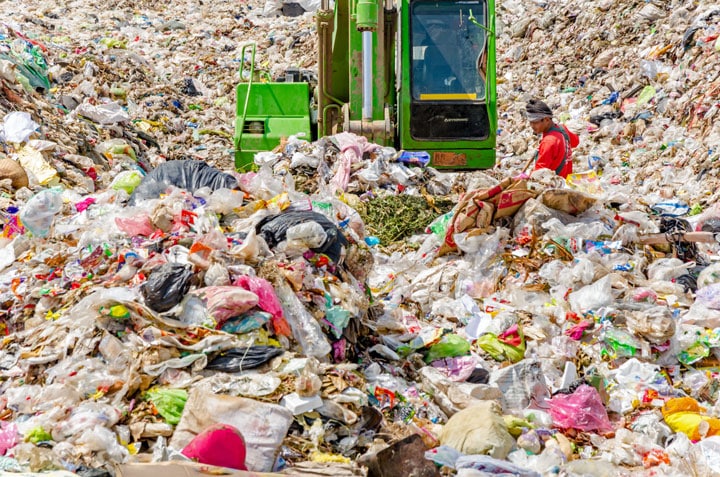
(Gigira / Shutterstock.com)
A picture paints a thousand words. This certainly applies to Thailand, a special country with an interesting culture and many cheerful people, but also a dark side of coups, poverty, exploitation, animal suffering, violence and road deaths.
In each episode we choose a theme that gives an insight into Thai society. No slick pictures of swaying palms and white beaches in this series. Sometimes hard, sometimes shocking, but also surprising. Today a photo series about waste, a major problem in Thailand.
Thais are major consumers of disposable plastic. Every year alone, 70 billion plastic bags are consumed. Along with China, Indonesia, the Philippines and Vietnam, Thailand is one of five Asian countries responsible for more than half of the eight million tons of plastic waste that ends up in the oceans each year, according to the Ocean Conservancy organization.
The dark side of tourism in Thailand is that it produces a lot of waste. Especially on the islands, the waste accumulates and is often thrown into the sea. In 2018, there was a garbage dump of 300.000 tons of waste on the holiday island of Koh Samui. And that while the garbage on Koh Samui is processed at a rate of 150 tons per day.
The waste is collected in the cities, but hardly or not at all in the many small villages. The villagers then burn their waste themselves, which is not really beneficial for the environment.
Many Thai are therefore not very aware of the environment. For example, the municipality of Bangkok (BMA) has fished 400.000 tons of waste from the capital's 948 canals in the past five years. That's because it comes from two sources: bulging bins from which waste falls into the water and from factories and residents who throw their waste into the water. The waste collected ranged from disposable plastic items to mattresses and even mosquito nets.
Waste
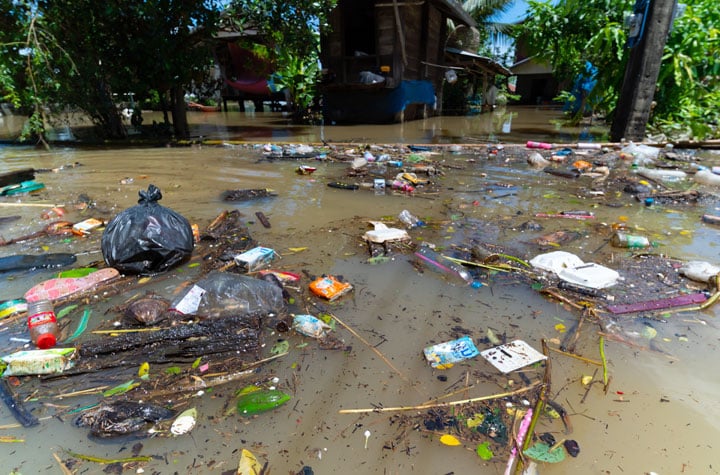
(frank60 / Shutterstock.com)
****

Illegal rubbish dump on Phuket (Thassin / Shutterstock.com)
****
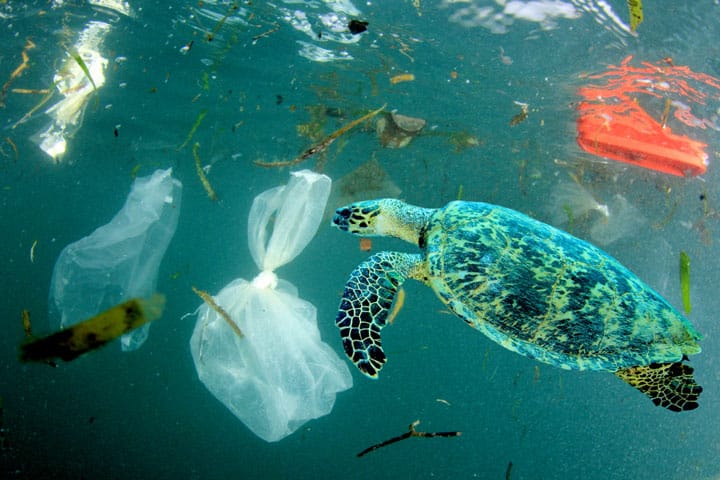
****
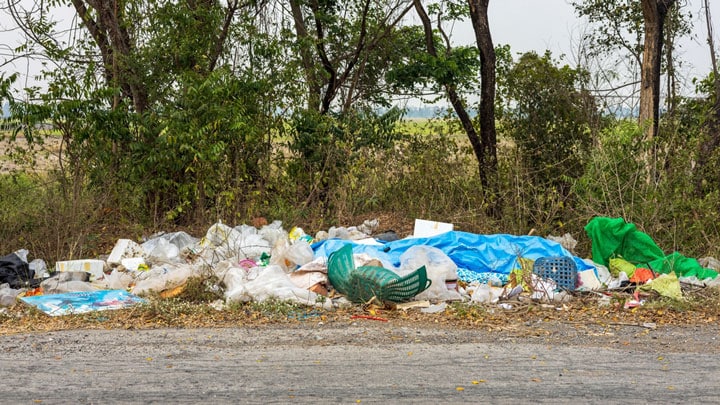
****

****

Sunstopper1st / Shutterstock.com
****
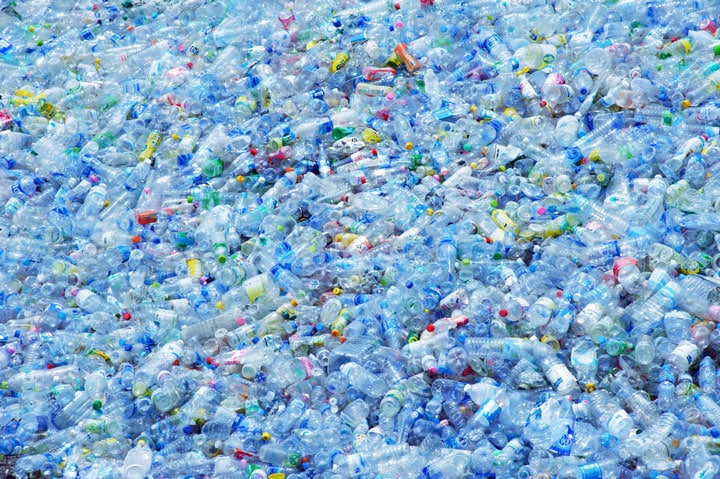
(OHishiapply / Shutterstock.com)
*****
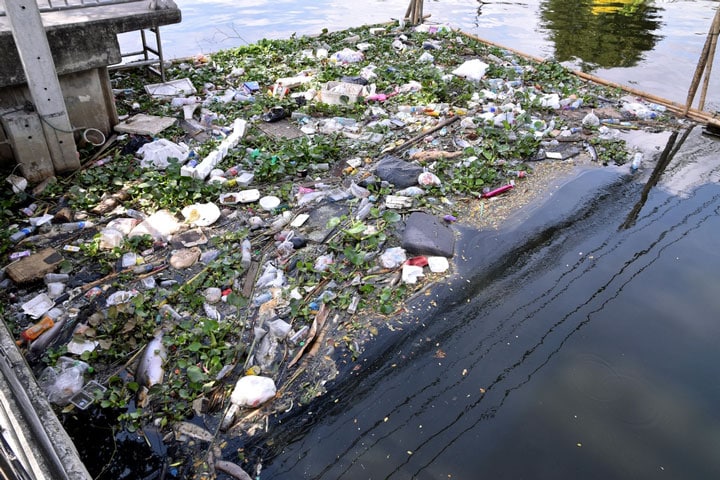
Garbage in a canal in Bangkok (andy0man / Shutterstock.com)
****
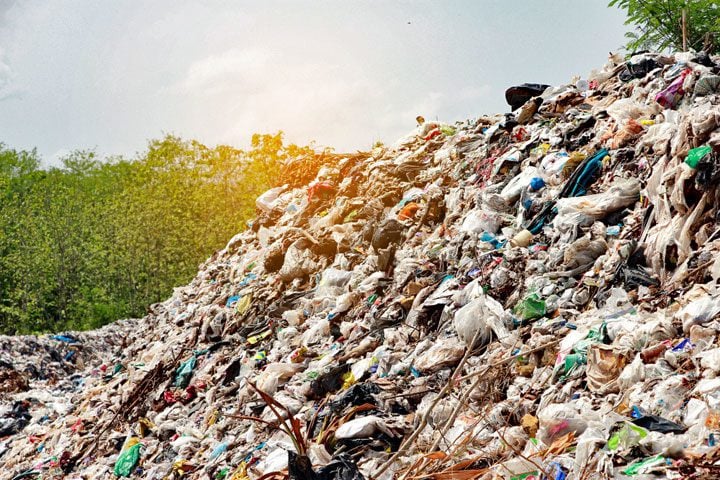
****
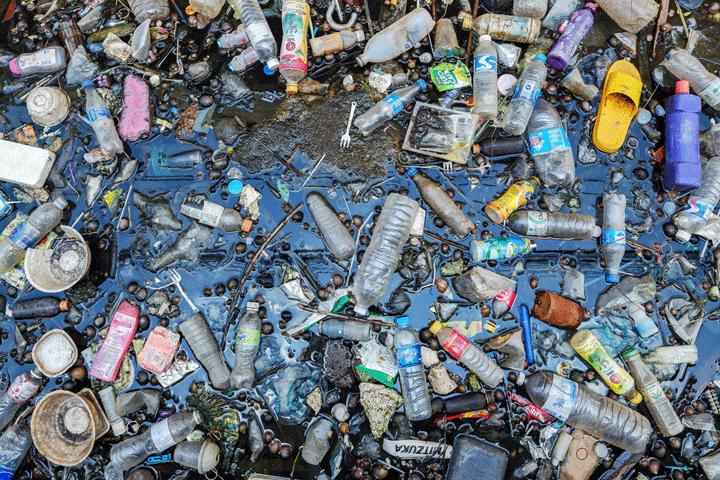


Yes,
These are the pictures you don't see in the holiday brochures.
It can also be assumed that the groundwater as well as the crops will now have a considerable degree of pollution in various places.
My brother-in-law once went to change the oil on his moped.
Unscrew the plug and just let the oil run into the ground.
And that at 2 meters from our vegetable garden.
On several islands the sewage system ends 100 meters into the sea.
This can be clearly seen from a height by the brown spot in the water.
In Patong Beach the sewage discharged (still discharges?) into the bay.
The people who swam there probably didn't know what those little round brown balls in the water were.
The brave soul will have thought about it and then thinks: the oil comes from the ground and what could be better: back to nature, it comes from the ground and what I do is actually recycle. So nothing to worry about.
If you are cycling in the vicinity of Chang Mai you come across garbage everywhere. Sometimes it seems as if a hotel has been renovated. All sinks, toilet bowls and tiles have been thrown away. A few cows are grazing next to it. I hear this from more people who visited Thailand. That the rubbish fell on everything.
Instead of a few stupid soap operas that you see daily on Thai TV, many Thai people could be taught in a weekly TV video what effects and costs this waste problem entails.
It is not only the groundwater that is polluted, but burning this waste, which many believe will solve the problem for good, causes enormous air pollution.
The ocean pollution alone causes situations in which many fish can no longer live because of plastic, or appear as fish full of microplastics in our meals.
Most Thais are very proud of their Pratheet Thai, the question remains why they make such a mess of it?
But even in most Western countries, where a lot of people are starting to think now, people have forgotten how people bought their food before the plastic age.
You can also provide education in those soaps. This is also done in the Netherlands and Belgium. We've been saying that for a long time. Just let those big superstars indicate that pieces of paper have to be thrown in the trash can and the public will automatically follow suit. Because everything these stars do or say is imitated
In addition to the already mentioned misery that all this often carelessly discarded garbage causes, there will also be many rats and other vermin that will also reproduce in these places at a dizzying speed….
In China town Bangkok there are thousands in the sewers.
During a visit, we spoke to one of the older females, who fed them daily.
The rats know when to eat.
This happened on our walking tour and my wife warned me to be careful where I put my feet as there were some rats running around my feet.
It is up to the Thai government to set up a properly functioning waste system.
As a citizen you can do little else with your waste than put it on the side of the road.
I recently put tiles and now have a large plastic container with cut tiles and chopped cement.
I will soon inform what I am supposed to do with it.
But luckily, if necessary, I can still store it in my storage, then the resident after me will sort it out.
Household waste is removed after collection. Personally, I went back two years after what was done with it. It is tipped into a slope in the forest or landscape. When the fold is filled, a few trucks of earth are poured over it and a compound is then built on it. (sic) Like air pollution, the waste problem does not divert the attention of the authorities. I need not elaborate on the reasons. They are generally known. People talk about it like during the climate conference in Glasgow, then back to the closet. What is also clear is that Thailand does not want international help in this matter. Is it pride, is it knowing and wanting to be able to do everything better, is it the lack of proper education, is it…? I leave that in the middle. Personally, however, I often ask myself whether the Thai deserve this land.
Dirt is brought until it is not visible, under the mat is even a short-term solution,
"What I certainly don't want to generalize is that there is certainly a nature culture among Thai people
give them the resources and they can do it, they are very powerful people, give them the resources and they will do well
Here on Koh SAMUI, legal waste dump sites have been designated. Waste can be deposited there and it is collected very regularly, almost daily. That already makes a huge difference to dumped waste in the jungle and along the roads. A step forward but still not enough…
There is a Corsair company in Bangkok that collects plastic, also via fishermen who fish plastic out of the sea, to then process it into oil, which can be used to make new plastic (so no fossil oil from the ground is needed) or can a clean diesel be made from it. (Buses are already running on that in Bangkok). The fishermen also receive compensation for the plastic waste they hand in.
This company was recently certified with the International Sustainability & Carbon Certification (ISCC).
A video about the cooperation with the fishermen's union : https://youtu.be/atdOFeUCyo8
In addition to the cooperation with fishermen, more and more large retail and hotel chains are also joining to have their plastic waste processed by Corsair and thus reduce their plastic 'footprint'.
More info : http://www.corsairnow.com
We pay 60 Baht every 4 months for the weekly emptying of our rubbish bin. Not much by our standards and I am happy to pay that to have my waste collected. By the way, we receive this waste bin from the municipality.
However, that garbage truck does not stop everywhere because there are quite a few who do not want to pay the 60 Baht. They find it too expensive and useless to spend money on it. They then burn themselves or it is dumped somewhere on a vacant lot or in a watercourse.
Or coming and filling my rubbish bin with it also happens sometimes... But I would rather have them dump it somewhere on the roadside.
But actually that garbage truck that collected my waste doesn't do much else. He will also dampen that in wells somewhere, layer of soil over it and that's it.
Serious steps can still be taken with waste, both in general collection and subsequent processing, if there is the will. And I think I should make sure that they don't have to pay for the collection/processing, then that obstacle will already be removed.
In the outskirts of Nongkhai, the rate is 20 baht per month. We don't get a rubbish bin but throw it - packed in plastic bags - in large rubber barrels along the road. The dogs can reach it, and the rats, so it's sometimes not worth looking at. Litter is also found in the outlying area, including furniture. A 'throw it down' mentality; 'after me the deluge…'.
A neighbor earns a few baht with it; picks up everything he can sell and keeps it until a buyer comes along. Tin cans, beer and cola cans, paper, bottles.
You will be familiar with the rubbish bins that we receive from the municipality. Can be closed at the top and also have a valve to fill them, but which no one actually uses because it is too small for a waste bag. There are also 2 wheels underneath. Ours are in green and the name of the municipality is painted on them.
We do not throw (beer) bottles, cans, cardboard, etc. into the normal waste. I give it to a neighbor who collects it and gets some Baht in return. No idea how much, but don't ask.
I mean, of course, that the valve is too small to fit a waste bag through. More like stabbing bottles. You must therefore always lift the lid to put your waste bag in it. The waste container itself is of course large enough
Here in Mae on we have to buy the waste bags. 5 baht per bag. We have been taking a lot to the recycling ourselves for six months now. Glass, plastic and cardboard. Then we only have 1 bag per week
Dear editor,
Collection and processing in ASEAN is a major problem, people pay nothing or very little, especially in rural areas, which means that investments cannot be made; raising public awareness only works if something is done about it, so it is a vicious circle. It is good to repeat this article again. It is sad that a lot of waste plastic in ASEAN comes from Europe, where Rotterdam in particular is the major transit port.
The waste tax that we pay to the municipality if we are still registered in the Netherlands finances the waste mafia in the Netherlands, which sends it in containers to corrupt countries under the guise of "recyclable". There is hardly any control over what is in those containers when they go on the boat, even less once it has arrived.
Since China no longer wants our junk in 2017, the Netherlands has shipped 200,000,000 kg that has demonstrably arrived in Indonesia, Malaysia and Thailand. In addition, the UK also shipped approximately 100,000,000 KG via Rotterdam, some of which ended up in Turkiye and Indonesia. And this continues! The USA sends the rubbish to Central and South America.
The destinations mentioned do not have enough capacity to process their own waste, let alone our own root mess.
Companies that collect litter from rivers, beaches and oceans cannot specify what is done with it, other than something like local authorities process it. WHERE?
It is strange that a major collector who is often in the press with “beautiful” videos is sponsored by SABIC, the Saudi Arabian Oil Company (ex DSM) and Coca Cola, both responsible for a large part of the production of virgin plastic and its single use. The petrochemical industry is still dumping the price of virgin plastic, the raw material, oil and gas, comes out of the ground almost for nothing so that the real recyclers can hardly get rid of the stuff. There are 100 kilos of clean, usable recycled plastic waiting around the world. It will take years before the Cokes, Danones, Nestles of this world start using 100% recycled plastic, as long as the oil companies have control over all countries. The meetings in Nairobi, Glasgow etc. are in good German Augenwischerei.
But complaining doesn't help much, so we do something about it: process waste plastic into building materials such as Lego blocks instead of bricks or concrete, roof tiles, paving tiles, planks, outdoor furniture, insulation material and much more. Every kilo of recycled plastic saves 700 grams of CO2 emissions. Wood replacement material helps prevent deforestation and also lasts much longer. There are also a few progressive producers in the Netherlands, but the big problem is money to invest and compete with the above-mentioned environmental killers.
In Indonesia, a few companies are making schools and houses from recycled plastic, possibly mixed with rice straw that would otherwise be burned. There is also a factory that makes MDF panels from wood waste, but where technology is now also available, developed by a rice farmer in the USA, to use rice straw in the MDF.
To combat the single use of plastic water bottles, we are setting up WaterATMs in Indonesia that supply purified water with a so-called cashless system, a Dutch invention that has been used 1.000 times in Kenya and was recently praised in a case study by RedCross. That water is purified in exactly the same way as that of the bottlers mentioned, only on a local scale, using solar energy. Saves tons of CO2 for transport and per ATM: 6 million 1,5 L bottles weighing a total of 200 tons of plastic per year that are not dumped into the river. Now we need investors to help this profit-making initiative grow.
Dick van Dijk, chairman of the Enviro-Pure Foundation (founded in 1989)
Thai government just participates:
https://thethaiger.com/news/national/thai-officials-tackle-environmental-concerns-over-4-5-million-kg-illicit-pork-burial
https://phuket-go.com/phuket-news/phuket-news/wastewater-still-polluting-kamala-beach-despite-phuket-officials-promising-action/
There was another wonderful story about cleaning a beach, where all the collected waste was dumped into created holes and covered again.
Quite recently there was another cleaning action on a beach, 4 tons
https://thethaiger.com/news/phuket/over-four-tonnes-of-rubbish-cleared-from-rang-kai-bay-in-major-cleanup-2
It is not stated where it went, probably again in a landfill.
My wife and many other officers were required to be present at a PUBLIC burning of drugs, all kinds of confiscated drugs. Just hop into the air. How can you imagine it?
Why wouldn't you improve drinking water from the tap? That quickly adds up to a nice bottle